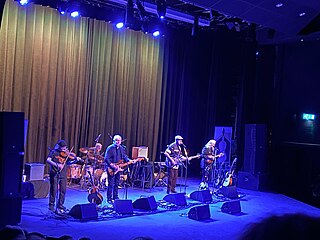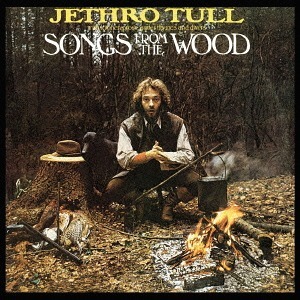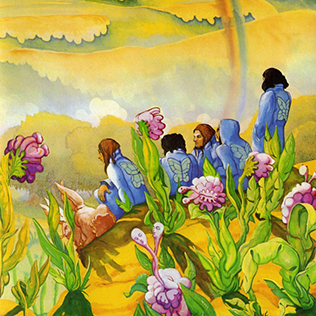Art rock is a subgenre of rock music that generally reflects a challenging or avant-garde approach to rock, or which makes use of modernist, experimental, or unconventional elements. Art rock aspires to elevate rock from entertainment to an artistic statement, opting for a more experimental and conceptual outlook on music. Influences may be drawn from genres such as experimental music, avant-garde music, classical music, and jazz.
Progressive rock is a broad genre of rock music that primarily developed in the United Kingdom through the mid- to late 1960s, peaking in the early 1970s. Initially termed "progressive pop", the style was an emergence of psychedelic bands who abandoned standard pop traditions in favour of instrumentation and compositional techniques more frequently associated with jazz, folk, or classical music. Additional elements contributed to its "progressive" label: lyrics were more poetic, technology was harnessed for new sounds, music approached the condition of "art", and the studio, rather than the stage, became the focus of musical activity, which often involved creating music for listening rather than dancing.
Instrumental rock is rock music that emphasizes instrumental performance and features very little or no singing. Examples of instrumental music in rock can be found in practically every subgenre of the style. Instrumental rock was most popular from the mid-1950s to mid-1960s, with artists such as Bill Doggett Combo, The Fireballs, The Shadows, The Ventures, Johnny and the Hurricanes and The Spotnicks. Surf music had many instrumental songs. Many instrumental hits had roots from the R&B genre. The Allman Brothers Band feature several instrumentals. Jeff Beck also recorded two instrumental albums in the 1970s. Progressive rock and art rock performers of the late 1960s and early 1970s did many virtuosic instrumental performances.

Magma is a French progressive rock band founded in Paris in 1969 by self-taught drummer Christian Vander, who claimed as his inspiration a "vision of humanity's spiritual and ecological future" that profoundly disturbed him. The style of progressive rock that Vander developed with Magma is termed "Zeuhl", and has been applied to other bands in France operating in the same period, and to some recent Japanese bands.
Folk rock is a fusion genre of rock music with heavy influences from pop, English and American folk music. It typically combines elements of folk and rock music together, it arose in the United States, Canada, and the United Kingdom in the mid-1960s. In the U.S., folk rock emerged from the folk music revival. Performers such as Bob Dylan and the Byrds—several of whose members had earlier played in folk ensembles—attempted to blend the sounds of rock with their pre-existing folk repertoire, adopting the use of electric instrumentation and drums in a way previously discouraged in the U.S. folk community. The term "folk rock" was initially used in the U.S. music press in June 1965 to describe the Byrds' music.

Fairport Convention are an English folk rock band, formed in 1967 by guitarists Richard Thompson and Simon Nicol, bassist Ashley Hutchings and drummer Shaun Frater. They started out influenced by American folk rock, with a set list dominated by Bob Dylan and Joni Mitchell songs and a sound that earned them the nickname "the British Jefferson Airplane". Vocalists Judy Dyble and Iain Matthews joined them before the recording of their self-titled debut in 1968; afterwards, Dyble was replaced by Sandy Denny, with Matthews later leaving during the recording of their third album.

Renaissance are an English progressive rock band, best known for their 1978 UK top 10 hit "Northern Lights" and progressive rock classics like "Carpet of the Sun", "Mother Russia", and "Ashes Are Burning". They developed a unique sound, combining a female lead vocal with a fusion of classical, folk, rock, and jazz influences. Characteristic elements of the Renaissance sound are Annie Haslam's wide vocal range, prominent piano accompaniment, orchestral arrangements and vocal harmonies.
Popular music of the United Kingdom in the 1970s built upon the new forms of music developed from blues rock towards the end of the 1960s, including folk rock and psychedelic rock movements. Several important and influential subgenres were created in Britain in this period, by pursuing the limitations of rock music, including British folk rock and glam rock, a process that reached its apogee in the development of progressive rock and one of the most enduring subgenres in heavy metal music. Britain also began to be increasingly influenced by third world music, including Jamaican and Indian music, resulting in new music scenes and subgenres. In the middle years of the decade the influence of the pub rock and American punk rock movements led to the British intensification of punk, which swept away much of the existing landscape of popular music, replacing it with much more diverse new wave and post punk bands who mixed different forms of music and influences to dominate rock and pop music into the 1980s.

Songs from the Wood is the tenth studio album by British progressive rock band Jethro Tull, released on 11 February 1977 by Chrysalis Records. The album is considered to be the first of three folk rock albums released by the band at the end of the 1970s, followed by Heavy Horses (1978) and Stormwatch (1979).
Neo-progressive rock is a subgenre of progressive rock developed in the UK in the early 1980s. The genre's most popular band, Marillion, achieved mainstream success in the decade. Several bands from the genre have continued to record and tour.
British folk rock is a form of folk rock which developed in the United Kingdom from the mid 1960s, and was at its most significant in the 1970s. Though the merging of folk and rock music came from several sources, it is widely regarded that the success of "The House of the Rising Sun" by British band the Animals in 1964 was a catalyst, prompting Bob Dylan to "go electric", in which, like the Animals, he brought folk and rock music together, from which other musicians followed. In the same year, the Beatles began incorporating overt folk influences into their music, most noticeably on their Beatles for Sale album. The Beatles and other British Invasion bands, in turn, influenced the American band the Byrds, who released their recording of Dylan's "Mr. Tambourine Man" in April 1965, setting off the mid-1960s American folk rock movement. A number of British groups, usually those associated with the British folk revival, moved into folk rock in the mid-1960s, including the Strawbs, Pentangle, and Fairport Convention.

Rock music arrived in Norway following the rock'n'roll musical revolution in the USA and Great Britain in the late 1950s. Norwegian rock quickly fostered capable musicians, but was strongly influenced by the Anglo-American starting point for the musical form. The leading Norwegian rock groups in the 1960s and 1970s largely expressed themselves in English, while Norwegian was long only used in the more traditional hit and pop music. Notable Norwegian rock bands include Titanic, a-ha, and Kaizers Orchestra.
Rock and roll entered Greece in the middle of the 1960s. Greek rock performers in the field include Pavlos Sidiropoulos, Dimitris Poulikakos. Greek rock bands well known globally are Aphrodite's Child, Socrates Drank the Conium and The Last Drive.
Serbian rock is the rock music scene of Serbia. During the 1960s, 1970s and the 1980s, while Serbia was a constituent republic of Socialist Federal Republic of Yugoslavia, Serbian rock scene was a part of the SFR Yugoslav rock scene.

Argent were an English rock band formed in 1969 by former Zombies keyboardist Rod Argent. They had three UK Top 40 singles: "Hold Your Head Up", which reached No. 5 and spent 12 weeks on the chart, "Tragedy", and "God Gave Rock and Roll to You". Two of their albums charted in the UK: All Together Now, which peaked at No. 13 in 1972, and In Deep, which spent one week at No. 49 in 1973.

Si on avait besoin d'une cinquième saison, better known as Les cinq saisons, is the second studio album by Canadian progressive rock band Harmonium. It was released on April 15, 1975, in Canada by Celebration Records, a subsidiary of Quality Records. It was the band's second and final release for the label, as its contract ended in October 1975. Les cinq saisons was released in France via Gamma Records. PolyGram, which absorbed the interests of Quality Records, later reissued the album on various formats in several countries.
Post-metal is a music genre rooted in heavy metal but exploring approaches beyond metal conventions. It emerged in the 1990s with bands such as Neurosis and Godflesh, who transformed metal texture through experimental composition. In a way similar to the predecessor genres post-rock and post-hardcore, post-metal offsets the darkness and intensity of extreme metal with an emphasis on atmosphere, emotion, and even "revelation", developing an expansive but introspective sound variously imbued with elements of ambient, noise, psychedelic, progressive, and classical music, and often shoegaze and art rock. Songs are typically long, with loose and layered structures that discard the verse–chorus form in favor of crescendos and repeating themes. The sound centres on guitars and drums, while any vocals are often but not always screamed or growled and resemble an additional instrument.
Medieval folk rock, medieval rock or medieval folk is a musical subgenre that emerged in the early 1970s in England and Germany which combined elements of early music with rock music. It grew out of the British folk rock and progressive folk movements of the late 1960s. Despite the name, the term was used indiscriminately to categorise performers who incorporated elements of medieval, renaissance and baroque music into their work and sometimes to describe groups who used few, or no, electric instruments. This subgenre reached its height towards the middle of the 1970s when it achieved some mainstream success in Britain, but within a few years most groups had either disbanded, or were absorbed into the wider movements of progressive folk and progressive rock. Nevertheless, the genre had a considerable impact within progressive rock where early music, and medievalism in general, was a major influence and through that in the development of heavy metal. More recently medieval folk rock has revived in popularity along with other forms of medieval inspired music such as Dark Wave orientated neo-Medieval music and medieval metal.
Bangladeshi rock music, or Bangla rock music, is a style of music in Bangladesh that is derived from British and American rock music, mixed with the Bengali classical and Adhunik musical styles from the 1960s. The genre was introduced in the 1960s by a few bands who began developing a distinctive rock sound. Bangladeshi rock is commonly divided into two categories: East Pakistan rock, and Bangladesh rock. From the 1970s to the 2000s, it was one of the nation's most popular musical genres.
21. Peron was a Turkish progressive rock band in the 1970s. The band was chosen to represent Turkey in the 1979 Eurovision Song Contest with a song called "Seviyorum"; however, due to political concerns, Turkey did not attend the final, which took place in Israel.







